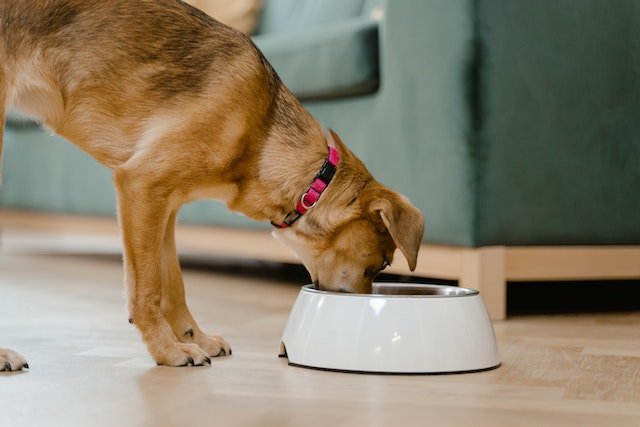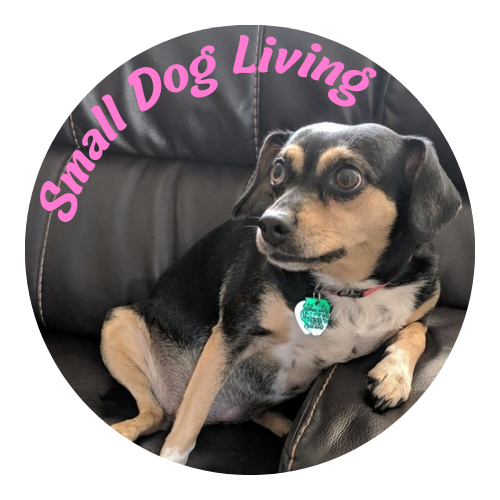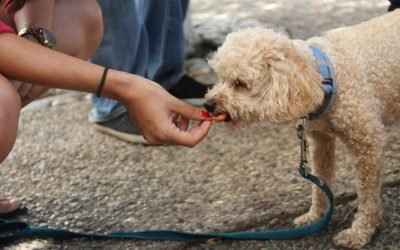Are grain free diets bad for dogs? This is a question that many pet owners are asking as grain free dog food becomes more and more popular.
While there is a lot of debate surrounding this issue, it’s important to understand the potential risks of feeding your canine a grain free diet.
Let’s explore the pros and cons of grain free dog food so that you can make an informed decision about the best diet for your pup.

The Pros of Grain Free Diets
Grain free diets have become increasingly popular among pet owners in recent years. Many people wonder, “Are grain-free diets bad for dogs?”
While there are pros and cons to a grain-free diet, there are some benefits that can be gained from switching your pup to a grain-free diet.
One of the main benefits of grain-free diets is that they are often better for dogs with allergies or food sensitivities. Grains can be difficult for dogs to digest and can cause allergic reactions.
Dogs on grain-free diets often experience fewer digestive issues, such as gas and bloating. This is because grain-free diets use proteins and other sources of nutrition as the main ingredients, rather than grains.
Many grain-free diets use higher-quality ingredients than traditional kibble. Grain-free dog foods usually contain more healthy proteins, such as fish or chicken, as well as fruits and vegetables. This can provide dogs with the essential vitamins and minerals they need for optimal health.
It is also important to carefully check the labels of any grain-free products you buy. Some products labeled as “grain-free” still contain grains, so make sure you read the ingredient list thoroughly. Finally, make sure you feed your pup a balanced and complete diet so that they get all the nutrients they need.
While there are both pros and cons to grain-free diets, they can be beneficial for dogs with allergies or food sensitivities. Switching to a grain-free diet may reduce digestive issues, while also providing essential vitamins and minerals.
It is important to consult your veterinarian before switching your pup’s diet to ensure that they are getting all of the nutrients they need. As with any dietary changes, make sure to introduce new foods slowly and watch your dog closely for any changes in behavior or appetite.
Grain-free diets may not be suitable for all dogs, so speak to your vet about what is best for your individual pup.
To answer the question “Are grain free diets bad for dogs?” – It depends on the individual dog and their dietary needs. A grain-free diet can be beneficial if it provides the right balance of proteins, fats, carbohydrates, and other vitamins and minerals needed by your pup.
The Cons of Grain Free Diets
When it comes to asking, “Are grain free diets bad for dogs?”, there is still a lot of debate.
On the one hand, some experts believe that grain-free diets are beneficial for dogs because they are lower in carbs and can be easier for some dogs to digest.
On the other hand, many veterinarians and nutritionists point out that grain-free diets are not nutritionally balanced and can put your dog at risk for certain health problems.
One of the biggest drawbacks of grain-free diets is that they may not provide all the nutrients that dogs need to stay healthy.
While grain-free diets are generally lower in carbohydrates, they may also be lacking important vitamins and minerals like calcium, zinc, and B vitamins. Without these essential nutrients, dogs can develop health issues such as anemia, dermatitis, and arthritis.
Additionally, grain-free diets often contain higher levels of fat than traditional kibble diets. This can lead to weight gain and can increase your dog’s risk for diabetes and other health problems.
Grain-free diets can be expensive, and some brands use lower-quality ingredients than traditional diets. For all these reasons, it’s important to consider whether a grain-free diet is the best choice for your dog.
If you’re considering switching your dog’s diet to grain-free, talk to your vet or a nutritionist first. They can help you make sure you’re making the right decision and will be able to tell you if the diet contains all the essential nutrients your pup needs.
It’s also important to do your research when it comes to choosing a grain-free diet. Make sure you know what kind of ingredients are in the food and look for products with high-quality proteins and low levels of fat. Be sure to read the label carefully and always consult with your veterinarian before making any big dietary changes for your pet.
At the end of the day, when it comes to asking, “are grain free diets bad for dogs?” The answer will vary from dog to dog. What works well for one pup may not be suitable for another so it’s always best to talk to your vet or a qualified nutritionist before making any decisions about your pup’s food.

Are Grain Free Diets Bad for Dogs?
It is difficult to definitively answer this question. While there are pros to a grain-free diet, such as better digestion and fewer allergies, there are also potential cons, such as the risk of deficiencies and potential heart issues.
As with any dietary change, it is best to consult a veterinarian prior to making any major changes. Discuss any potential concerns or risks associated with a grain-free diet for dogs.
Ultimately, it is up to the pet owner to weigh the pros and cons of a grain-free diet and decide what works best for their dog’s individual needs. See my post on What Human Food Can Puppies Eat for 10 great people foods that are good for dogs of all ages.
For more information about potentially hazardous foods for dogs, see my post on Is Cat Food Harmful to Dogs? It is also good to note that there are many human foods that should never be fed to your dog. See my post on What Human Food is Bad for Dogs.
As always, it is important to give your dog proper nutrition as part of an important part of a dog’s health along with feeding the recommended amount.
Also please consider being a dog foster parent. See my article on How to Be a Foster Parent for Dogs for details.
Thank you for visiting Small Dog Living and leave us a comment if you can.








0 Comments